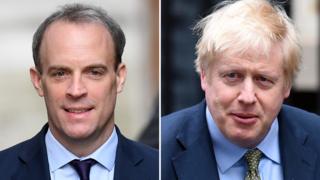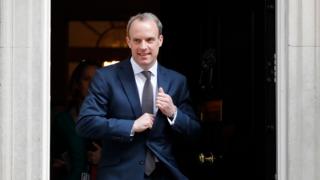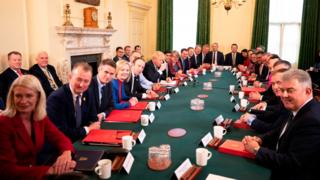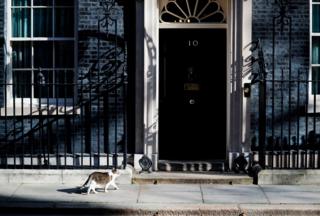 Image copyright Getty Images
Image copyright Getty Images Foreign Secretary Dominic Raab states he has “all the authority” he requires to make pertinent choices as he deputises for Boris Johnson, who stays in health center with coronavirus.
But who else is sharing power and how are choices made while the prime minister is ill?
Why is Dominic Raab in charge?
Mr Raab is the foreign secretary, however he likewise has the title of very first secretary of state – offering him seniority above all other cabinet ministers.
So if the main position modifications, and Mr Johnson does not go back to his post, Mr Raab would take control of in the very first circumstances.
When Mr Johnson was moved into extensive care – where his health is stated to be enhancing – Mr Raab stated the federal government would continue to focus “at the prime minister’s instructions” on beating coronavirus.
Why exists no deputy prime minister?
The function of deputy prime minister – like that of very first secretary of state – is not a long-term position in federal government. Somebody is designated at the discretion of the prime minister.
The last deputy PM was Liberal Democrat Nick Clegg, throughout the 2010-15 union federal government with the Conservatives.
What will Dominic Raab have the ability to do?
Although Mr Raab has actually been asked to deputise for the PM while he remains in extensive care, we understand really little about precise level of his authority.
There are different things just the prime minister can do – however a few of these might be used up by Mr Raab without much difficulty.
For example, he might make suggestions to the Queen on consultations to the senior judiciary and high-ranking positions in the Church of England.
 Image copyright Getty Images
Image copyright Getty Images But it’s more difficult to picture him performing a reshuffle – although, officially, it appears he should have that power.
It would be challenging for him to authorise military action at brief notification. Other ministers would more than likely need to concur initially, however the dollar would stop with Mr Raab.
Then, there are the letters of last option the prime minister composes for nuclear submarines, providing commanders guidelines about what to do in case of a fatal attack. It’s not likely Mr Raab would need to compose them unless Mr Johnson was disarmed for a very long time.
What is cumulative obligation?
When asked if his function let him take choices, Mr Raab stated there was “overall unity” amongst his cabinet associates and described the system of cumulative obligation.
It suggests that in practice, any significant choices will most likely be taken by Mr Raab in assessment with the cabinet or, where suitable, senior civil servants.
The cabinet is the supreme decision-making body of federal government, comprised of the most senior ministers consisting of the house secretary, the health secretary and the chancellor of the exchequer.
After February’s basic election, Boris Johnson formed a cabinet of 22 complete members – including himself – and 4 other going to members.
So although he’s the head of the federal government and has some private powers, essential choices are taken jointly in cabinet.
And the concept of “cumulative duty” suggests each cabinet choice is binding for each member – even if they personally disagreed with it.
Not all choices are taken by complete cabinet. It’s typical for there to be “cabinet committees” – smaller sized groups of ministers concentrated on particular problems.
 Image copyright Getty Images
Image copyright Getty Images Are there unique coronavirus committees?
There are 4 “execution committees” dealing with various parts of the action.
They’re taking a look at health care, the general public sector reaction, economics and company, and the worldwide action.
Each is chaired by a cabinet minister and feeding into an everyday overarching “C-19 conference” – led in the prime minister’s lack by Dominic Raab.
 Image copyright Getty Images
Image copyright Getty Images What if Boris Johnson officially gave up control?
If Boris Johnson ended up being incapacitated and could not continue as PM, the guidelines for what need to take place next are uncertain – an effect of the UK’s unwritten constitution. We do have some concept of what may take place.
The cabinet handbook is the closest thing we need to a file which sets out the function of the prime minister.
It recommends the cabinet would pick a replacement who the Queen would ask to form a federal government. That might be Mr Raab or another senior MP. The expectation is that she or he would remain in location up until the Conservative Party designated a brand-new leader.
According to the Institute for Government believe tank, prime ministers continue in workplace unless they pass away or resign.
It includes: “While political celebrations generally have the capability to designate an ‘acting leader’ if the leader is or resigns crippled, there is no official ‘acting prime minister’ function. She or he would be prime minister up until they selected to resign or if their cabinet required them out.”

- A SIMPLE GUIDE: How do I safeguard myself?
- AVOIDING CONTACT: The guidelines on self-isolation and workout
- LOOK-UP TOOL: Check cases in your location
- CHARTS and maps: Visual guide to the break out
- STRESS: How to care for your psychological health



Recent Comments